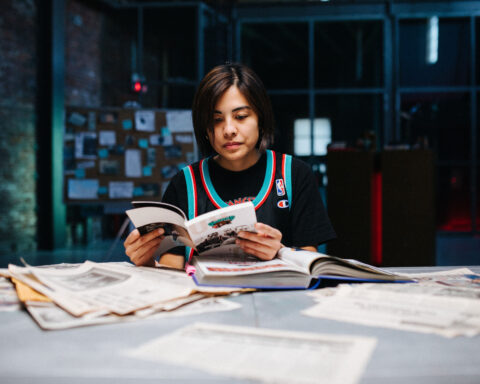The Marriage Project
(Iran/France/Qatar, 80 min.)
Dir. Atieh Attarzadeh and Hesam Eslami
Several years ago, Iranian filmmaker Atieh Attarzadeh set out to make a film about love. Her goal was to document the joy and sense of freedom that her marriage brought her. As her ex-husband once told her, “love is the only thing that allows you to break the boundaries others have defined for you.” Although her initial cinematic plans derailed with the demise of the relationship, her latest documentary The Marriage Project, co-directed with Hesam Eslami, presents a complicated and riveting exploration of love within the confines of mental illness.
At the Ehsan’s House psychiatric facility in Tehran, the majority of the 500 patients will live on the hospital grounds until they die. Dealing with both mental disorders and the reverberations of familial traumas, it can be a rather lonely life for the patients. However, just because someone is isolated from the outside world does not mean that they lack the same urges that other people have. In fact, Dr. Farhad Ramezanejad believes it is important to ensure that their emotional and sexual needs are met.
Embarking on a rather ambitious social experiment, Dr. Ramezanejad plans to fulfill his patients’ basic human desires by encouraging them to get married and build lives together on the hospital grounds. Constructing a mosque on site, complete with apartments above for the couples to inhabit, Dr. Ramezanejad aims to have 40 people be part of the pilot project. He and his team would facilitate everything from the selection of the individuals involved to the monitoring of medications to the mediation of spousal disputes. While some of the patients are excited at the prospects of having true intimacy, many of Dr. Ramezanejad colleagues oppose his plans on both a moral and practical level.
Presenting the moral and logistical complexities of the experiment in a non-judgmental way, The Marriage Project is a thought-provoking work that is bound to spark plenty of discussion. Attarzadeh and Eslami’s documentary makes a compelling argument for the way that love can be a freeing and stabilizing force in people’s lives. It is the only thing that truly seems to give hope and normalcy to some of Dr. Ramezanejad’s patients, Sahar, who longs to marry her long-time love Seifollah, and Marjan, who desperately wants to have a baby. Weaving in aspects of her own past romance into the film, Attarzadeh shows that, while there are no guarantees in life, the benefits that come with love are sometimes worth the risks.
The question that Attarzadeh and Eslami’s documentary wrestles with is how much risk should psychiatric institutions such as Ehsan’s House be allowed to take. Though the patients are technically adults, they exist in a society where religion and patriarchy govern even those whom society has forgotten. Furthermore, as if driving a rickety bus with seatbelts in select seats, there can be serious consequences for an experiment that is limited in its safeguards. As one psychologist astutely notes, relationships come with a set of emotional ups and downs that can be triggering for those who are barely coping with life even when on medication.
One must also consider how much free will should be considered in the structured system that Dr. Ramezanejad is proposing. If the physicians are choosing who are suitable to couple up and defining the parameters, then how meaningful and therapeutic can these bonds be? Just because one throws two random ingredients together does not mean they make for a satisfying dish.
The Marriage Project is a fascinating and stunning examination of love and mental illness. The film does not provide any easy answers, leaving it up to the viewer to contemplate the pros and cons of Dr. Ramezanejad’s venture. The patients clearly deserve the right to have love in their life, the question is who should govern what form that love takes.
The Marriage Project plays online at the Rendezvous with Madness Film Festival from October 15 – October 17.










